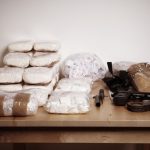Calls to Stop Baseless Ban on Amyl Nitrite

The Therapeutic Goods Administration (TGA) has just released an interim decision that would see amyl nitrite and other nitrite inhalants banned across Australia. The proposal would move these drugs into schedule 9 of the Poisons Standard along with substances such as heroin.
Amyl nitrite is the most well-known amongst a range of alkyl nitrite inhalants used to enhance sex and for a short recreational highs. Also known as poppers, amyl nitrite has been popular for decades amongst the LGBTIQ community and various clubbing and dance scenes.
The TGA outlined that it’s considering outlawing these party drugs because a number of eye specialists have reported an increase in retinal damage linked to nitrite inhalants. There’s also been a reported increase in the use of these drugs in the community.
However, critics of the ban have called it unwarranted and unjustified. They assert that nitrite inhalants are not drugs of dependence, that the harms associated with them are minimal, and that their use as a blood vessel dilator and muscle relaxant is beneficial for receptive sexual partners.
Indeed, the ban will disproportionately affect the LGBTIQ community, criminalise thousands of Australians who recreationally use these drugs, and push the use of nitrite inhalants underground, where harms will increase, as the quality of the drugs become more dubious.
Minimal damage compared to overall use
“Nitrite inhalants have been used in the gay community for over 40 years,” explained health researcher Daniel Reeders.
The vocal critic of the ban pointed out that the annual UNSW Gay Community Periodic Survey found that recent nitrite use rates are at 35 to 40 percent amongst gay men, which is consistent with rates over the last decade.
And these figures would equate to around 90,000 people who use the inhalants in the LGBTIQ community alone.
“So, the fact that there are only isolated case reports of adverse events related to nitrite use indicates that nitrite inhalants are, overall, not a serious risk to health,” Mr Reeders told Sydney Criminal Lawyers®. And he added that legal substances like alcohol also carry risks.
Currently, it’s technically illegal to sell nitrite inhalants in Australia. But, they’re available for purchase over the counter at adult shops, where they’re labelled as leather cleaner or room deodoriser. Popular brands include Rush, Jungle Juice and Ram.
Blurring the risks
Reeders explained that under section 52E of the Therapeutic Goods Act 1989, the TGA must consider the risks and benefits of a substance, when assessing whether to reschedule it. But, in its interim decision it’s listed benefits, “such as euphoric, analgesic and muscle relaxant effects,” as risks.
“This indicates the TGA has prejudged the issue. The only reason to consider those effects as risks is if the committee were already convinced that nitrites are a poison,” he said, adding that the decision gave no consideration to the “risks of product substitution driven by its own regulatory action.”
A growth in criminal trade
Veteran drug law reformist Dr Alex Wodak recalled the comments of Dr Michael Wooldridge at the time sildenafil, or Viagra, became available. The then Australian health minister said he’d rather see Viagra legal and regulated as demand was strong, rather than it being sourced on the black market.
“So, sildenafil has been readily available by prescription since then without controversy,” Dr Wodak said via email.
The Australian Drug Law Reform Foundation president made clear that a ban on nitrite inhalants would result in them being widely available on the black market, where “there would inevitably be some loss of quality” due to the unregulated nature of the market.
“Some providers would receive a financial bonanza,” Dr Wodak continued. “A few lawyers, accountants, financial planners, banks and real estate agents would benefit” as well.
Education is key
Writing in the Star Observer, sexual health activist Steve Spencer said that rather than banning nitrite inhalants, there should be a focus on regulating their production and availability, as well as educating the public about the risks around their use.
Charles Sturt University senior research fellow Julaine Allan said in the Conversation that nitrite inhalants are not addictive or poisonous if inhaled, but they should never be swallowed as they can cause coma or death.
Mr Spencer pointed out that people should “only buy genuine high-quality poppers,” which should always be refrigerated and thrown out after a month or two. And he also stressed that “there is no public health justification for banning poppers.”
A similar proposal to ban nitrite inhalants in the United Kingdom was rejected back in 2016. The British government’s Advisory Body on the Misuse of Drugs found that these drugs were “not seen to be capable of having harmful effects sufficient to constitute a societal problem.”
A very low probability of harm
According to Mr Reeders, media coverage of the concerns raised by some ophthalmologists in Australia and other countries has led to the TGA’s move to ban these substances.
However, he points out that a dozen cases of partial vision loss reported in Europe in 2007 were caused by a substitute product that manufactures switched to after authorities banned a more commonly used nitrite inhalant.
“Now, any case of vision loss is inherently serious,” Mr Reeders continued. But, eye specialists “only see the cases where harm has eventuated, they have no insight into the vast number of occasions of use that don’t result in vision loss.”
Mr Reeders has made a submission to the TGA, following its interim decision. The TGA is receiving these submissions until 11 October. And it’s final decision on the ban will be published on 29 November. If amyl is outlawed, the ban will take effect on 1 February next year.
“The TGA’s own guidance on the risk-based approach requires it to consider not just the harm if an event occurs, but the probability of the event,” Mr Reeders concluded. “The TGA’s interim decision focuses entirely on the harm and ignores the very low probability of the event.”







